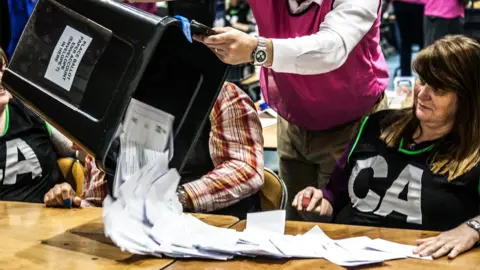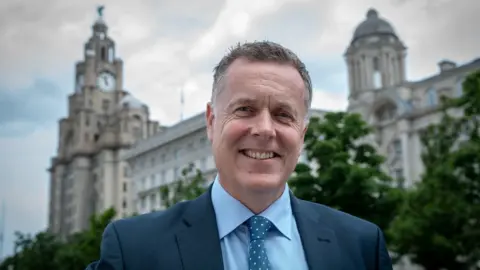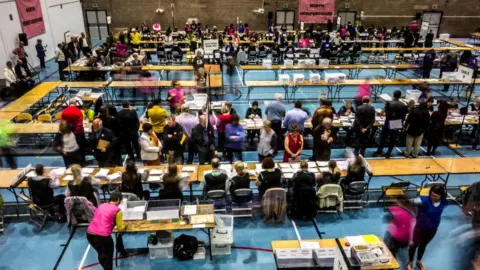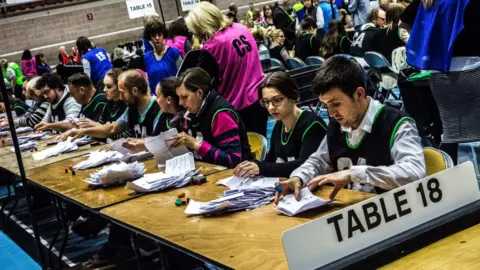General election 2019: What happens at the counts?
 Getty Images
Getty ImagesWhen the polls close at 22:00 GMT on Thursday some of the nation's voters will be in the dark over the election result until morning. But what's happening during these night time hours of suspense at vote counts across the country?
As polling stations shut their doors many people get settled in front of the television to watch the drama unfold while others head to bed, perhaps checking their phones for updates and news of exit polls before turning the lights out.
But others are sitting in rows under bright strip lights in schools, town halls and sports centres, sorting ballot papers.
Three-time vote counter Ella Rees said a buzz of excitement united tables of strangers and powered them through the night as papers piled up and anxious candidates paced the room.
The 21-year-old law student will be counting again this time, in her home constituency of Shrewsbury and Atcham. She counted votes in the 2017 local and general elections and the Brexit referendum in 2016.
"It's exciting because it's something out of the ordinary for everyone, you're up all night concentrating, the press are outside and the national picture is emerging on TV," she said.
 Ella Rees
Ella ReesThe election count would be an experience maths and statistics enthusiast Andrew Burgess-Tupling from Pontefract thought he would enjoy.
"I've loved watching the BBC coverage of election night since 1992 when I was a student in Birmingham," he said.
"It was fascinating how the night panned out from the expectation of a hung parliament.
"From the race to see who will declare first to the shocks and surprises - it's brilliant."
Mr Burgess-Tupling used Your Questions Answered to ask: "How are the vote counters selected? How can you become involved?"
 Andrew Burgess-Tupling
Andrew Burgess-TuplingMiss Rees said she emailed the elections department at her local authority and they sent her an application form.
"It was really straightforward, it just asked if you had any relevant experience in admin-type tasks," she said.
Councils would tend to file the details of people who have expressed an interest in taking part and contact them ahead of election polls and counts.
Those working on elections would need to act impartially and could not actively support any political party or individual candidate, the rules state.
Roles for under-18s must comply with employment law on night working and number of hours.
Relatives of candidates would need to declare the relationship when they accepted any role.
 Christian Smith
Christian SmithTony Reeves, chief executive of Liverpool City Council, will be the returning officer responsible for 212 polling stations and the counts for five constituencies.
"This will be the first general election for me in Liverpool," said Mr Reeves, who performed the role during his eight years at Bradford Council.
"I absolutely love election day. It's a big operation and my role is to oversee everything and carry the legal risk for the process. It's not a job for shrinking violets," he said.
"It'll be a 22 hour shift for me. I go out and about inspecting 20 to 30 polling stations and then there's the count.
"Everything is meticulously planned and executed in a robust and transparent way so everybody can have genuine confidence in the process.
"I'll get asked around a dozen times to make decisions on big issues.
"It's pretty tense for the candidates, it's exciting in terms of the competition, the mood in different parts of the room changes over the course of the evening and recounts are tense too."
 Getty Images
Getty ImagesMiss Rees said when she has worked at previous counts she was sitting at a table of six at Sundorne Sports Village in Shrewsbury and the ballot boxes were delivered.
"They empty the boxes on to the tables, so there are ballot papers everywhere," she said. "First we counted them into piles of 25 regardless of the marks on them.
"Then you say how many papers you have in total and there's someone who knows how many papers should be in each box.
"If it's wrong they will tell you it's wrong but not by how many. Then you count them all again until it's right or until you get the same number again."
The returning officer would record any discrepancies and give a statement to candidates and agents.

How much do you get paid?
A returning officer responsible for the election for the entire constituency earned between £2,500 and £4,343 in 2017.
A presiding officer responsible for the polling station throughout the day was paid between £200 and £300.
Supervisors, counters and runners were paid a daily or hourly rate that varied across the country.
Miss Rees said she was paid £15 an hour and worked for 10 hours as a vote counter.

Before the votes for each candidate were counted, ballot papers from different boxes would be mixed to preserve the secrecy of the vote.
"You get some spoilt papers and they get shown to the candidates," said Miss Rees. "There are some that are a squiggle half in one of the boxes but there are senior people to make calls on things like that."
All of the valid votes and rejected votes would be added together and checked against the total number of ballot papers from the first stage of the count.
The returning officer would share the provisional result with candidates and their agents and any recounts would take place.
The number of votes cast for all candidates would then be read out and the person with the most votes declared as the MP for the constituency.
 Getty Images
Getty ImagesMiss Rees said counting for the EU referendum felt like she was contributing to a significant piece of history as she was two months too young to vote.
"You're with people you haven't met before of all different ages and you're all working together," she said. "You're all tired but it's a really exciting atmosphere so the time flies.
"There's something about being there in the moment. I enjoy the atmosphere and being among the candidates and seeing the political system from the inside."
